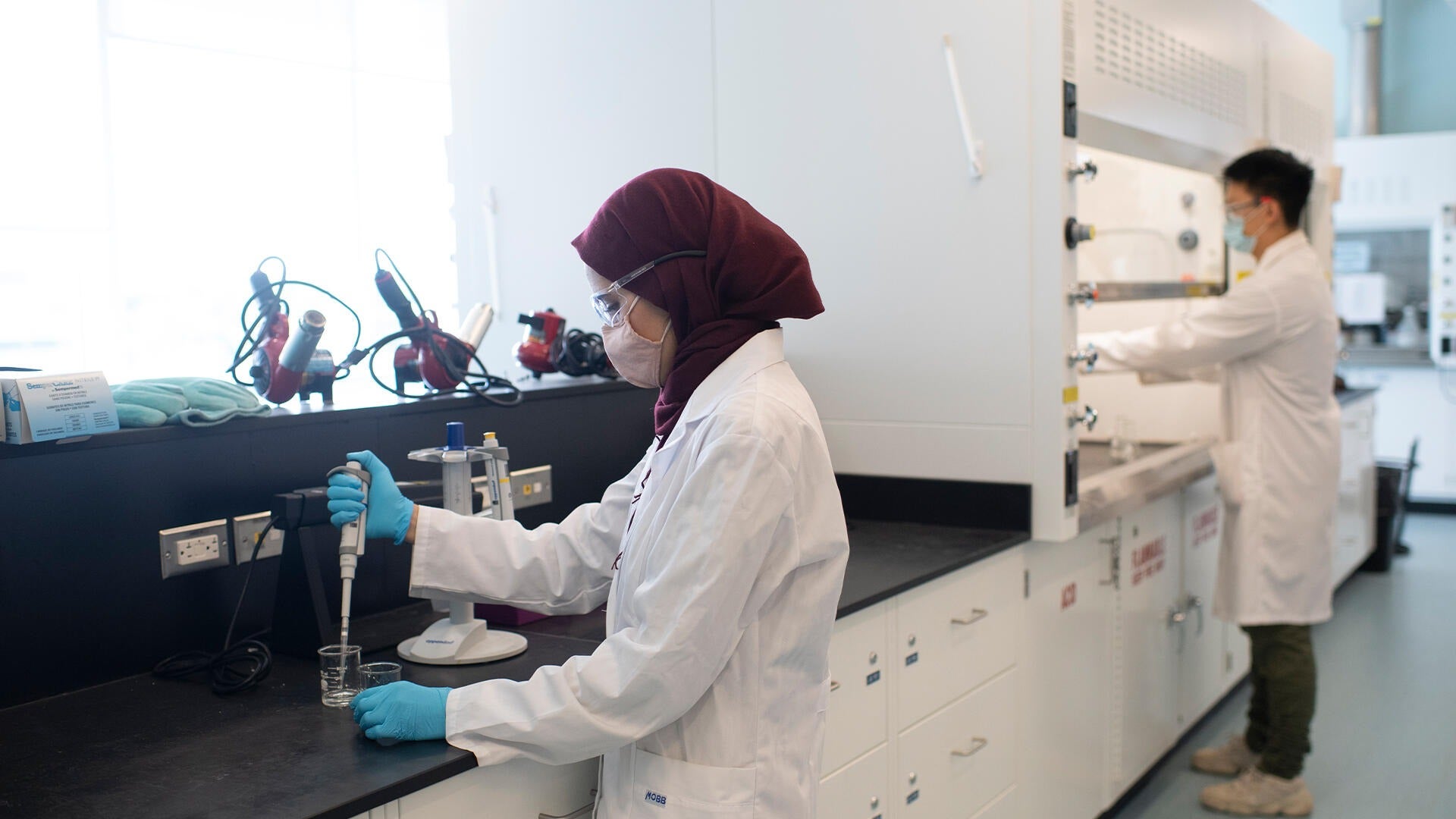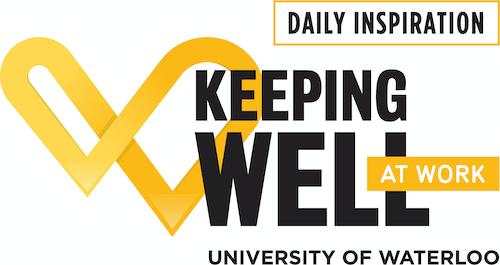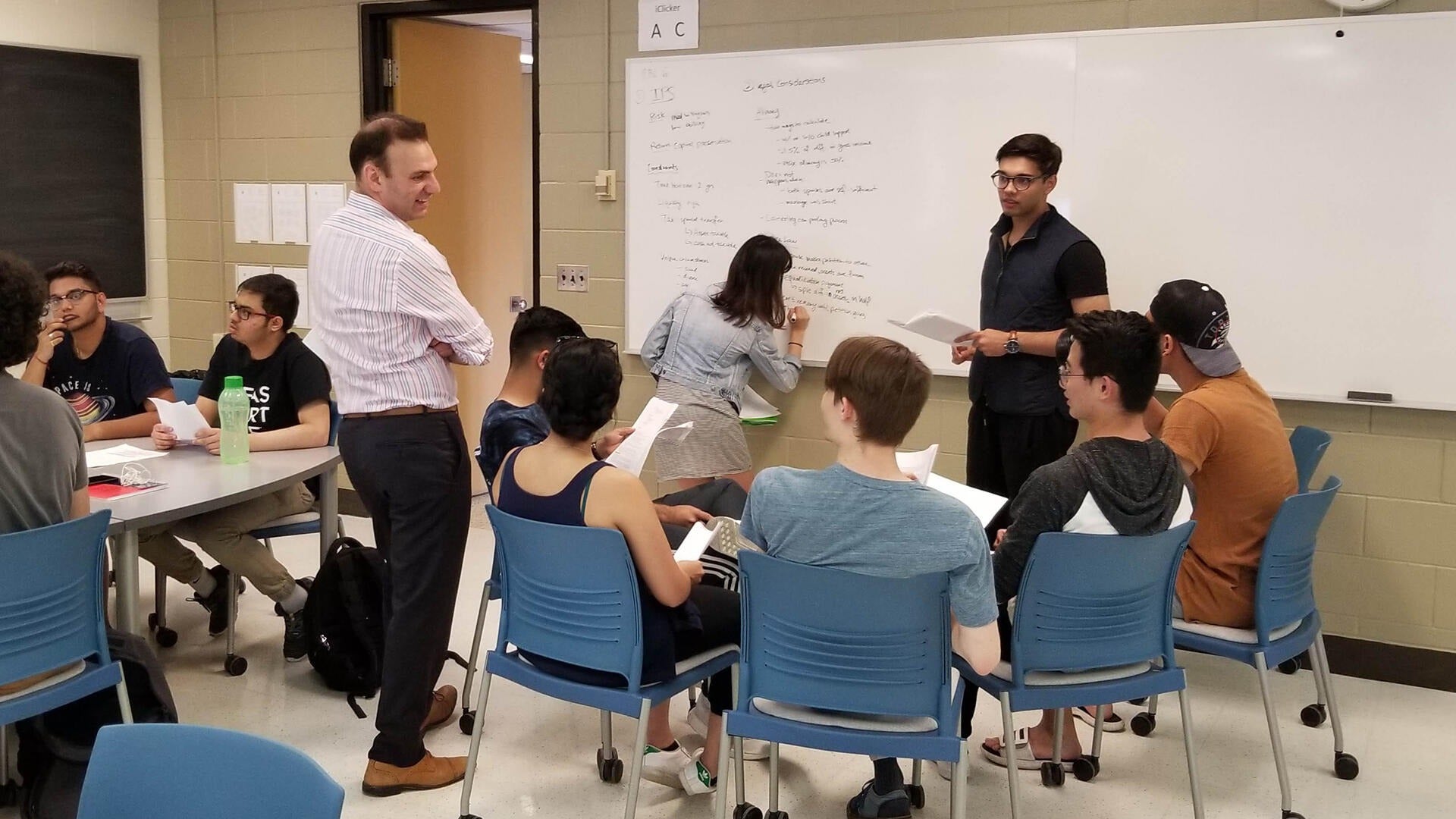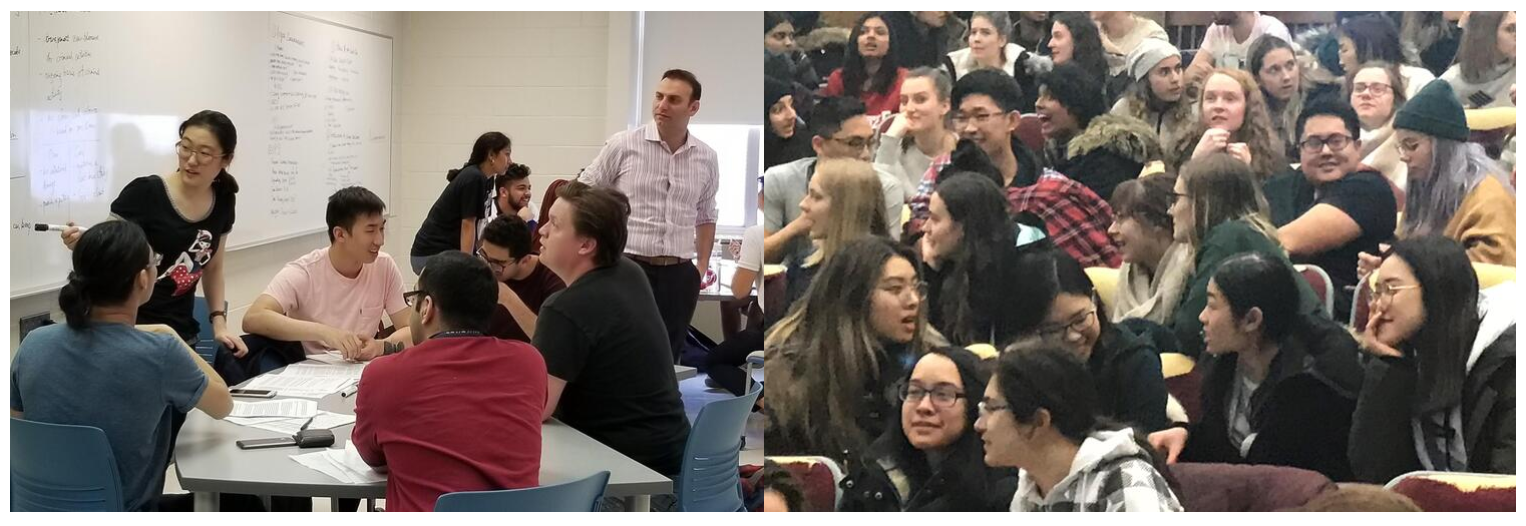Editor:
Brandon Sweet
University Communications
bulletin@uwaterloo.ca
Once more, with feeling: we're Canada's Innovation University

By Natalie Quinlan. This article was originally published on Waterloo News.
The University of Waterloo has secured its top spot as most innovative University in Canada. For 29 years, Waterloo held this title, 2020 being the exception. The University of Toronto and University of British Columbia follow in second and third place.
Numerous startup incubators and entrepreneurial support programs are housed at the University of Waterloo, including Velocity, Concept and St. Paul’s GreenHouse,” says Sanjeev Gill, associate vice-president, innovation. “Our former students or graduates go on to become leading entrepreneurs and researchers, founding unicorn companies valued at more than $1 billion, such as Faire founded by Waterloo alumnus Marcelo Cortes and ApplyBoard, co-founded by Engineering alumnus Martin Basiri.”
Waterloo’s flagship incubator, Velocity, has also witnessed alumni and residents collectively raising more than $2.4 billion USD, a 40 per cent increase from $1.7 billion raised at the end of 2020. Other Waterloo reputational results from Maclean’s 2020 rankings include:
- Moving up to 3rd from 4th in the Leaders of Tomorrow category (behind University of Toronto and University of British Columbia)
- Remaining at 3rd in the Best Overall category (behind University of Toronto and University of British Columbia)
- Remaining at 4th in the Highest Quality category (behind University of Toronto, McGill University and University of British Columbia)
Results in the reputation area are based on a survey that Maclean’s conducts each year. Survey participants included guidance counsellors, faculty member, senior administrators and a variety of businesspeople. Respondents completed the survey online and were asked to rate Canada’s universities in three categories — highest quality, most innovative and leader of tomorrow. Best overall represents the sum of the scores for all three categories.
Student Voices Survey and program area rankings
Maclean’s also runs a Student Voices Survey where 19,000 students from across Canada responded. Waterloo was also noted as second nationally in terms of average entering grades in Canada at 91.6% (behind University of Manitoba), while tying with the University of British Columbia and University of Toronto for #1 in computer science, but dropping to #2 in engineering (behind University of Toronto).
Waterloo remains #1 for experiential learning and improved to 2nd from 3rd last years in course instruction.
Comprehensive Universities
Maclean’s “Comprehensive Universities” category highlights 15 universities who showcase a significant amount of research activity and a wide range of programs at the undergraduate and graduate level but have no medical school. These results are based on survey responses from university administrators, faculty and a variety of businesspeople.
Waterloo remains #1 in the areas of social sciences and humanities grants, scholarships and bursaries as a percentage of operating expenses and in reputation among comprehensive universities.
“The University of Waterloo continues exemplify its leadership in the areas of innovation, experiential education and developing talent for a complex future,” says Vivek Goel, president and vice-chancellor at the University of Waterloo. “It is because of our exceptional community of students, researchers, faculty members, staff and University partners that we continue to achieve such prestigious rankings in Canada.”
Keeping Well at Work Conference for employees starts tomorrow

Do you wish you could plan meals like a dietician? Needing to quiet your mind with some yoga and meditation? Trying to figure out how to fit exercise into your workday routine in a sustainable way? Feeling burnt out by supporting others?
It sounds like you need to be at the Keeping Well at Work Conference tomorrow. The good news is, registration is still open for both Wednesday, October 13 and Tuesday, October 19.
“Choosing to prioritize our health while at work is often a secondary or even tertiary focus,” says Sue Grant, Manager of Employee Development in Organizational and Human Development (OHD). “More than ever, with so little separation between work and non-work life, we see the need for wellness-building practices throughout the workday as critical. And that’s what Keeping Well at Work is all about.”
It’s the 5th annual KW@W event for University of Waterloo Employees, and the first year OHD takes the reins from the Healthy Workplace Committee.
“Waterloo employees are driven, hard-working and service-oriented – which also results in packed calendars, missed lunch breaks and increased potential for burnout,” shares Melanie Will, OHD’s new Director. “We’ve scheduled just two hours of Keeping Well at Work programming on two, spaced-out days to ensure minimal impact on productivity and maximum potential for employee participation.” Participation, she anticipates, that will lead to inspiration, revitalization and healthier choices around well-being at work.
Don’t miss the October 13 line-up, kicking off with Keynote Anthony McLean at 10:30am on Teams Live.

Every day in October, KW@W is sharing a quick Daily Inspiration challenge or activity across a spectrum of wellness themes and highlighting the many resources and supports available to Waterloo employees.
Today is all about Thankful Thoughts: Take 1 minute and write down as many things as you can that you are thankful for. Then, take 2 minutes to just breathe and meditate on these things. Try this breathing meditation (scroll down to start) from our health partners at Homewood Health.
Redesigning education with innovation in mind

By Natalie Quinlan. This the second in a series of articles focused on the developing talent framework as outlined in Waterloo's strategic plan.
COVID-19 has reshaped the way educators around the world teach and students learn. Fading are the days where rows of desks facing the front of the classroom are standard practice. Instead, reliance on heightened opportunities with technology integrated with flexible learning schedules and environments is paving the way for a revolution in education. The pandemic has, in many ways, forced changes in teaching and learning that will remain present even after it’s over.
For several years now, the University of Waterloo’s approach to teaching and learning has also been shifting its focus. Based on research and expert advice, instructors are relying less on traditional lecture formats and focusing their attention on learning styles that encourage students to develop practical skills necessary for the working world.
These include learning opportunities stemming from teamwork, collaboration and navigating various forms of technology. Traditional lecture halls where rows of chairs face the front of the room are being redesigned with flexibility in mind, allowing furniture to swivel and environments to be easily modified for a more collaborative experience.
“It doesn’t mean we throw out everything that we’re doing,” David DeVidi, associate vice-president, academic at the University of Waterloo. “But some of what we do needs to change so that we can be offering students what they will need ten years from now.”

Flexible learning classroom versus traditional lecture hall. (Photos taken pre-pandemic)
The same momentum can be seen in the University’s strategic commitment to enhancing educational opportunities by creating increasingly flexible curricula that stimulate reflective, deep learning for experiences that can be applied to real-world settings.
Many of these newer approaches to pedagogy will work much better in less traditional learning spaces, and the University is working to gradually transform its stock of teaching spaces to make them more adaptable. Leading this initiative has been the Teaching and Learning Spaces Committee (TLS), established in 2020, which has received a multi-year financial commitment to upgrade and update some of Waterloo’s classrooms and other learning spaces.

David DeVidi
> Associate Vice-President, Academic
“Right now, most of our spaces have rows of chairs and desks that are nailed to the floor which is, of course, fine for traditional lecture courses, but if we’re hoping to continue doing innovative things, we’ll often need spaces that go beyond just lecture settings,” says DeVidi. “That’s the idea behind improving these classrooms — refreshing and redesigning them — this flexibility will present our instructors and students with more options for teaching and learning.”
The University has always had budgets and processes for classroom maintenance. Annually, $350,000 is dedicated to classroom upgrades and repairs. However, the point of the TLS Project budget is not to cover routine ongoing maintenance costs, but to reshape selected classrooms, usually spaces identified by students and instructors as among the most problematic on campus. Project timelines stretch from one to three years. For instance, in 2020 a classroom in the Psychology, Anthropology and Sociology building (PAS) was chosen for redevelopment into a new, flexible learning space, which is scheduled to become available for Spring 2022.
More flexible spaces to come
University leaders approved approximately $1.6 million of additional funding for larger projects set for completion in 2023. One will be an active learning space that includes substantial learning technologies, such as multiple screens placed strategically around the room to facilitate idea-sharing in group settings, whether learners are in-person or remote. Upgrades to two larger classrooms in a mathematics building will also be taking place.
This ongoing project is only one of a group of related initiatives designed to support a culture of pedagogical excellence, creativity and innovation at Waterloo. Also on the horizon is the Teaching Innovation Incubator, a concept at the centre of the proposals brought forward during the development of Waterloo’s 2020 – 2025 strategic plan.
The University already has systems that support incremental improvement in teaching. The Centre for Teaching Excellence, for instance, can help an individual instructor become a better teacher or a program to decolonize its curriculum.
“The Incubator will be a place to try out ideas with the potential for more disruptive changes,” says DeVidi. “It will be a one-stop-shop: projects accepted into the incubator will get all the supports they need to develop, test drive and evaluate their potential for success. That will put everyone in a good position to decide whether the idea is worth investing in to scale up and implement.”
The concepts all aim at preparing the University and its students for the complex future that awaits them.
For more information on the Teaching and Learning Spaces initiatives at Waterloo, visit their website.
Link of the day
When and Where to get support
Students can visit the Student Success Office online for supports including academic development, international student resources, leadership development, exchange and study abroad, and opportunities to get involved.
Instructors looking for targeted support for developing online components for blended learning courses, transitioning remote to fully online courses, revising current online courses, and more please visit Agile Development | Centre for Extended Learning | University of Waterloo (uwaterloo.ca)
Instructors can visit the Keep Learning website to get support on adapting their teaching and learning plans for an online environment.
Course templates are available within your course in LEARN to help you build and edit your content and assignment pages quickly.
The following workshops, webinars, and events are offered by the KL team (CTE, CEL, ITMS, LIB):
- Independent Remote Course Design Essentials, self-directed, continuous self-enrollment course in LEARN.
- Independent Blended Course Design (iBlend), self-directed, ongoing
- Copyright Overview for Waterloo Instructors and Staff - self-directed, continuous self-enrollment course in LEARN.
-
Thirty Minute Thursdays– PebblePad – Offered: October 21, October 28, November 11, November 18, November 25, 12:00 noon to 12: 30 p.m.
-
PebblePad Users Group (CTE7526) - October 20, 1:00 p.m.
-
Online Instructional Skills Workshop (ISW) (CTE8601), begins on October 22, 8:00 a.m.
-
Getting Ready to Facilitate Online Courses: TA Training, beginning November 1.
Employees can access resources to help them work remotely, including managing University records and privacy of personal information. Here are some tips for staying healthy while working from home.
Stay informed about COVID cases on campus by consulting the COVID case tracker.
The Writing and Communication Centre has virtual services and programs to help undergrads, grad students, postdocs and faculty members with academic writing.
- Meet with writing advisors in one-to-one appointments to brainstorm, draft, revise, and polish. No time for an appointment? Try email tutoring for undergrads.
- Beat isolation and make writing progress at weekly Virtual Writing Cafés for grad students and faculty or PJ-Friendly Writing Groups for Undergrads.
- Take an online workshop or apply to our popular Dissertation Boot Camp program.
- Faculty can request custom in-class workshops for their courses, or the WCC can facilitate any existing workshops for student groups.
Co-op students can get help finding a job and find supports to successfully work remotely, develop new skills, access wellness and career information, and contact a co-op or career advisor.
The Centre for Career Action (CCA) is offering some in-person services for fall 2021. The Tatham Centre is open with front-desk support, limited in-person appointments and co-op consults. Services are also available virtually. Book an appointment online or Live Chat with our Client Support Team. The CCA is here to help.
If you feel overwhelmed or anxious and need to talk to somebody, please contact the University’s Campus Wellness services, either Health Services or Counselling Services. You can also contact the University's Centre for Mental Health Research and Treatment. Good2Talk is a post-secondary student helpline available to all students.
While the Library continues to focus on digital resources and consultations, our spaces are open for the fall term. Dana Porter Library is open Monday to Friday, 9 a.m. to 5 p.m., and Davis Centre Library is open Monday to Friday, 9 a.m. to 11 p.m., and Saturday and Sunday, 11 a.m. to 5 p.m. for drop-in individual study space, bookable individual study rooms, drop-in access to computers and printers, book pick-up services and IST Help Desk support. Special Collections & Archives and the Geospatial Centre will be accessible by appointment. Library staff are available for questions via Ask us. Full details on current services and hours are available on the Library’s COVID-19 Update webpage.
The Faculty Association of the University of Waterloo (FAUW) continues to advocate for its members. Check out the FAUW blog for more information.
The University of Waterloo Staff Association (UWSA) continues to advocate for its members. Check out the UWSA blog for more information.
The Sexual Violence Prevention and Response Office (SVPRO) supports all members of the University of Waterloo campus community who have experienced, or been impacted, by sexual violence. This includes all students, staff, faculty and visitors on the main campus, the satellite campuses, and at the affiliated and federated Waterloo Institutes and Colleges. For support, email: svpro@uwaterloo.ca or visit the SVPRO website.
The Indigenous Initiatives Office is a central hub that provides guidance, support, and resources to all Indigenous and non-Indigenous campus community members and oversees the university Indigenization strategy.
The Waterloo Indigenous Student Centre, based at St. Paul’s University College, provides support and resources for Indigenous students, and educational outreach programs for the broader community, including lectures, and events.
WUSA supports for students:
Peer support - MATES, Glow Centre, RAISE, Women’s Centre - Visit https://wusa.ca/peersupport to book an appointment either in person or online for the Fall term!
Food Support Service food hampers are currently available from the Turnkey Desk 24/7 in the Student Life Centre. Drop off locations are also open again in SLC, DC, DP, SCH and all residences.
Co-op Connection all available online. Check https://wusa.ca for more details.
Centre for Academic Policy Support - CAPS is here to assist Waterloo undergraduates throughout their experience in navigating academic policy in the instances of filing petitions, grievances and appeals. Please contact them at caps@wusa.ca. More information is available.
WUSA Student Legal Protection Program- Seeking legal counsel can be intimidating, especially if it’s your first time facing a legal issue. The legal assistance helpline provides quick access to legal advice in any area of law, including criminal. Just call 1-833-202-4571.
Empower Me is a confidential mental health and wellness service that connects students with qualified counsellors 24/7. They can be reached at 1-833-628-5589.
When and Where (but mostly when)
Healthy Warriors at Home (Online Fitness)
Warriors vs. Laurier Blood Donation Battle. Join your fellow Warriors, donate blood and help us win the Blood Battle against Laurier for a second year in a row. Set up a profile or add the PFL code: UNIV960995 to your account if you have a blood.ca account already. Questions? Contact WarriorsInfo@uwaterloo.ca.
Drop-in to Warrior Virtual Study Halls on Wednesdays from 5:30 p.m. to 7:00 p.m. Come together in this virtual space to set goals and work independently or in groups each week.
Renison English Language Institute continues to offer virtual events and workshops to help students practice their English language skills.
Keeping Well at Work conference, Wednesday, October 13 and Tuesday, October 19.
Naismith Classic Basketball Tournament. Thursday, October 14 to Saturday, October 16. Cheer on your Warriors as they battle against teams across Ontario. Purchase your tickets today.
Spanish and Latin American Studies presents Dr. Dolores Figueroa Romero, “Binational Dialogues on the Challenges to Document Violence Against Indigenous Women in Mexico and Canada,” Tuesday, October 19, 11:00 a.m. RSVP to Jorge Castaneda Ochoa, j3castanedaochoa@uwaterloo.ca.
GEDI Exchange Webinar - A 30 Minute Exchange with Metagenom Bio and Ceragen, Tuesday, October 19, 1:00 p.m. Join this discussion with Metagenom Bio and Ceragen as they discuss Microbiomes: Building a business and feeding the world. Register online.
2021 Benjamin Eby Lecture, “Composing Louis Riel's Dream: Exploring the history of the Red River Settlement through family stories and music”, Thursday, October 21, 7:30 p.m., Conrad Grebel University College. Virtual event.
Warriors Football vs. Western. October 23, 1:00 p.m. Think Pink in support of the Breast Cancer Cause at the Canadian Cancer Society, Donor Appreciation Day. Purchase tickets.
NEW - Pivot-RP Training Session for Waterloo faculty and staff who support research proposal development. Tuesday, October 26, 2:00 p.m. to 3:00 p.m. Please register to receive a link to this session on Teams.